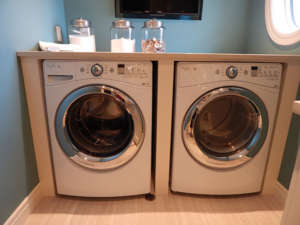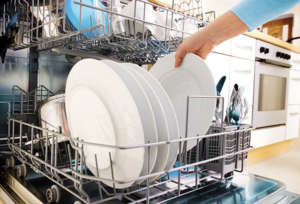Water Hardness
According to the U.S. Geologic Survey, 85% of the United States has hard water. Hard water is caused by excessive levels of calcium and/or magnesium. Earlier generations coined the phrase “hard water” because it made cleaning difficult.
The U.S. Department of the Interior classifies hardness based on the concentration of grains per gallon (gpg) of calcium and/or magnesium. To put this in perspective, a typical aspirin equals about five grains of material. If the aspirin were dissolved in a gallon of water it would add 5 gpg of “aspirin” to the water.
The government classifies water as follows:
- Soft (less than 1.0 gpg of calcium and/or magnesium)
- Slightly hard (1-3.5 gpg)
- Moderately hard (3.5-7.0 gpg)
- Hard (7.0-10.5 gpg)
- Very hard (greater than 10.5 gpg)
While hard water is not unhealthy, it does cause other problems:
 Laundering
Laundering
- Soap curd (sticky film formed when soap is used in hard water) influences fabric life and fading.
- Fabrics washed in hard water tend to wear out up to 15% quicker than those washed in soft water.
- Colors also fade and whites darken more quickly when cleaned with hard water.
- In addition, laundry washed in hard water is more easily re-soiled.
Note: According to a 1991 Purdue Study
Hard Water Scale
- The minerals in hard water gradually settle, forming a hard scale surface.
- This scale eventually will clog pipes and can decrease the lift of toilet flushing units by 70% and water faucets by 40%.
- Hardness scale shortens the life of washing equipment, dishwashers, and clothes washers by as much as 30%.
Note: According to a report published by the American Water Works Association (AWWA).
Water Heater Efficiency
- Hardness scale tends to form on the heating elements and heat transfer surfaces in water heaters.
- Scale build-up can reduce a gas water heater’s efficiency by as much as 29%, and an electric water heater’s efficiency by as much as 21%.
- A study conducted, found that a water heater’s useful life can be reduced by as much as 50% through scale build-up.
Note: According to studies conducted by New Mexico State University and The Office of Saline Water, U.S. Department of the Interior.
 Cleaning Tasks
Cleaning Tasks
- Soap curd makes cleaning and washing less effective and efficient.
- Greater physical effort and more cleaning agents are needed for surfaces such as floors, sinks, and bathtubs.
- The time required for typical cleaning tasks can be increased by almost 50% with hard water.
Note: According to a comparison study of hard and softened water sources for household use conducted by Ohio State University
Bathing
Soap curd film on the body can leave skin dry and hair dull and limp.
Streaks and Spotting
Soap curd formation can result in streaks, spots, and film on glass and dishware.
